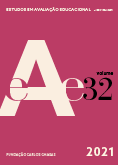Rubrics: performance assessment oriented to skills in higher education
DOI:
https://doi.org/10.18222/eae.v32.7582Keywords:
Measuring Instrument , Skills Evaluation , Evaluation Criteria , Higher EducationAbstract
The present article aims to describe intervention, using rubrics, in the evaluation of student performance, production and procedures related to a given competency. It is based on the edumetric approach, recognizably more fair for the evaluation of competencies, due to its training function. Aspects of this new culture of evaluation are revealed, as well as evaluation criteria, qualitative levels and a grading strategy using rubrics. A case study of the construction of a rubric by a professor in higher education, and its reformulation under the guidance of one of the present authors, is presented. It is based on the consistency dimension of a pedagogical evaluation design model in a digital context. It reflects on the need for technical support for the teacher, in order to construct rubrics under the proposed model.
Downloads
References
AMANTE, L.; OLIVEIRA, I. Nova cultura da avaliação: contextos e fundamentos. In: AMANTE, L.; OLIVEIRA, I. (coord.). Avaliação das aprendizagens: perspectivas, contextos e práticas. Lisboa: Universidade Aberta, 2016. p. 41 -53.
AMANTE, L.; OLIVEIRA, I.; PEREIRA, A. Cultura da avaliação e contextos digitais de aprendizagem: o modelo PrACT. ReDoC – Revista Docência e Cibercultura, Rio de Janeiro, v. 1, n. 1, set./dez. 2017. Disponível em: http://www.e-publicacoes.uerj.br/index.php/re-doc/article/view/30912/23520. Acesso em: 10 jan. 2018.
ARAÚJO, E. S. A aprendizagem e o desenvolvimento profissional docente sob as luzes da perspectiva histórico-cultural. In: ENCONTRO NACIONAL DE DIDÁTICA E PRÁTICA DE ENSINO, 12., 2004, Curitiba. Anais [...]. Curitiba, 2004. p. 3507-3518. CD-ROM.
BRINKE, D. Assessment of prior learning. Maastricht, the Netherlands: Datawyse, 2008.
CARVALHO, R. S.; FERNANDES, C. T. Easy Rubric: um editor de rubricas no padrão IMS Rubric. In: WORKSHOPS DO CONGRESSO BRASILEIRO DE INFORMÁTICA NA EDUCAÇÃO, 2012, Brasília, DF. Anais [...]. São José dos Campos, SP, 2012. Disponível em: http://br-ie.org/pub/index.php/wcbie/article/view/1949/1708. Acesso em: 10 mar. 2018.
CONDEMARÍN, M.; MEDINA, A. Avaliação autêntica: um meio para melhorar as competências em linguagem e comunicação. Tradução: Fátima Murad. Porto Alegre: Artmed, 2005.
ESTEBAN, M. T. A avaliação no cotidiano escolar. 2. ed. Rio de Janeiro: DP&A, 2001.
FERNANDES, D. Para uma teoria da avaliação no domínio das aprendizagens. Estudos em Avaliação Educacional, São Paulo, v. 19, n. 41, p. 347-372, 2008. Disponível em: http://www.fcc.org.br/pesquisa/publicacoes/eae/arquivos/1454/1454.pdf. Acesso em: 20 fev. 2018.
FERNANDES, T. P. da S. Avaliação digital da aprendizagem: estudo de caso no contexto da unidade curricular “Seminário de Práticas em Ciências Físico-Químicas”. 2012. Dissertação (Mestrado em Pedagogia do E-learning) – Departamento de Educação e Ensino a Distância, Universidade Aberta, Lisboa, 2012.
FIGUEIRA, A. P. C. Aprendizagem auto-regulada: diferentes leituras teóricas. Psychologica, Coimbra, v. 18, p. 47-77, ago. 1997.
FREITAS, L. C. Crítica da organização do trabalho pedagógico e da didática. Campinas, SP: Papirus, 2003.
HARTMAN, H. Como ser um professor reflexivo em todas as áreas. Tradução: Luciana Vellinho Corso e Alexandre Salvaterra. Porto Alegre: AMGH, 2015.
KLEIN, R.; FONTANIVE, N. Uma nova maneira de avaliar as competências escritoras na redação do ENEM. Ensaio: Avaliação e Políticas Públicas em Educação, Rio de Janeiro, v. 17, n. 65, p. 585-598, dez. 2009. Disponível em: http://www.scielo.br/scielo.php?script=sci_arttext&pid=S0104-40362009000400002. Acesso em: 25 mar. 2018.
LUCKESI, C. C. Avaliação da aprendizagem: componente do ato pedagógico. São Paulo: Cortez, 2011.
LUNT, I. A prática da avaliação. In: DANIELS, H. (org.). Vygotsky em foco: pressupostos e desdobramentos. Campinas, SP: Papirus, 1995. p. 219-252.
MARINHO-ARAÚJO, C.; RABELO, M. L. Avaliação educacional: a abordagem por competências. Avaliação: Revista da Avaliação da Educação Superior, Campinas, SP, v. 20, n. 2, p. 443-466, jul. 2015. Disponível em: http://www.scielo.br/pdf/aval/v20n2/1414-4077-aval-20-02-00443.pdf. Acesso em: 20 mar. 2018.
ORANTES, A. Edumetría y psicometría: implicaciones para el diagnóstico y la evaluación. Sinopsis Educativa – Revista Venezolana de Investigación, Caracas, v. 6, n. 2, Dic. 2006.
PEREIRA, A.; OLIVEIRA, I.; TINOCA, L. A cultura de avaliação: que dimensões? In: COSTA, F. et al. (ed.). Encontro Internacional TIC e Educação – TICeduca. Lisboa: Universidade de Lisboa, 2010. Disponível em: http://ticeduca2010.ie.ulisboa.pt/resumos/pages/artigos/ArtigosA/350.pdf. Acesso em: 12 fev. 2018.
PORTO, S. A avaliação da aprendizagem no ambiente online. In: SILVA, R. V.; SILVA, A. V. (ed.). Educação, aprendizagem e tecnologia. Lisboa: Edições Sílabo, 2005.
SANTOS, E. O.; SILVA, M. A pedagogia da transmissão e a sala de aula interativa. In: LUPION, P. T. (org.). Complexidade: redes e conexões na produção do conhecimento. Curitiba: Senar-PR, 2014. p. 45-59.
SCALLON, G. Avaliação da aprendizagem numa abordagem por competências. Tradução: Juliana Vermelho Martins. Curitiba: PUCPRess, 2015.
SIMON, M.; FORGETTE-GIROUX, R. A rubric for scoring postsecondary academic skills. Pratical Assessment, Research and Evaluation, v. 7, n. 18, jun. 2001. DOI: https://doi.org/10.7275/bh4d-me80.
VELOZO, A. V. Avaliação por competência no domínio de língua estrangeira: uma aplicação profissional mediada por rubrica. 2014. 156 f. Dissertação (Mestrado em Gestão da Informação) – Programa de Pós-Graduação em Ciência, Gestão e Tecnologia da Informação, Universidade Federal do Paraná, Curitiba, 2014.
Downloads
Published
How to Cite
Issue
Section
License
Copyright (c) 2021 Estudos em Avaliação Educacional

This work is licensed under a Creative Commons Attribution-NonCommercial 4.0 International License.
Authors who publish in this journal agree to the following terms:
a. Authors retain the copyright and grant the journal the right to first publication, with the paper simultaneously licensed under the Creative Commons Attribution License (CC BY 4.0) license that allows the sharing of the paper with acknowledgment of authorship and initial publication in this journal.
b. Authors are authorized to assume additional contracts separately, for non-exclusive distribution of the version of the paper published in this journal (for example publishing in institutional repository or as a book chapter), with acknowledgment of authorship and initial publication in this journal.
c. Authors are allowed and encouraged to publish and distribute their paper on-line (for example in institutional repositories or on their personal page) at any moment before or during the editorial process, as this can generate productive changes, as well as increase the impact and citation of the published paper (See The Effect of Open Access).







